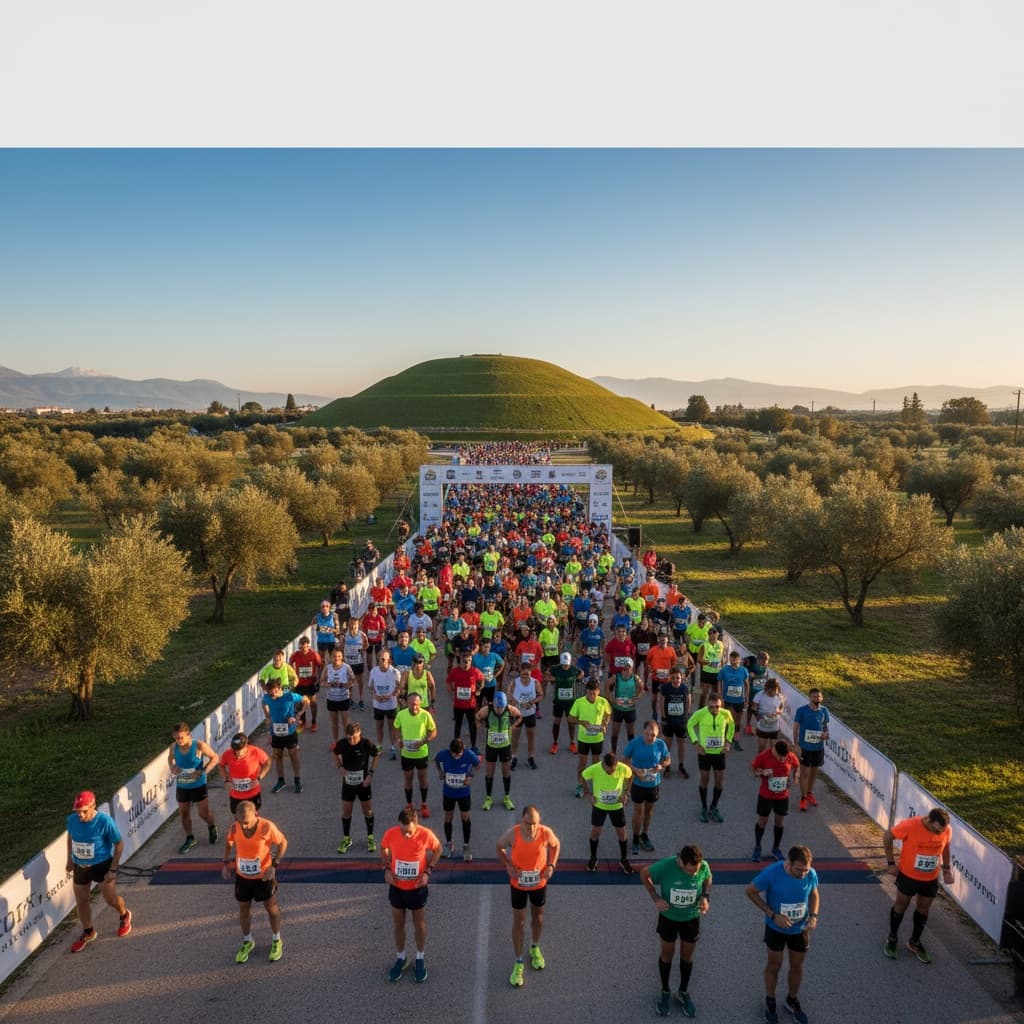Athens Marathon: Running Where It All Began
It's 9 AM in the small town of Marathon, Greece, and you're standing beneath the Tumulus—the burial mound where 192 Athenian warriors fell fighting the Persians in 490 BC. Around you, thousands of runners stretch, check their watches, and gaze down the road that leads to Athens, 42.195 kilometers away. You're not just running a marathon. You're running the marathon, tracing the footsteps of Pheidippides himself, the messenger whose legendary run gave birth to every race that would follow.
This is what sets the Athens Marathon apart from every other race on the calendar. While modern marathons wind through city streets and past contemporary landmarks, here in Greece, you're running through history itself.
The Weight of Legend
The story is simple, mythic, and deeply embedded in running culture: in 490 BC, after the Athenian victory at the Battle of Marathon, a messenger named Pheidippides ran from the battlefield to Athens to announce the victory. He delivered his message—"Nenikékamen!" (We have won!)—and then collapsed, his mission complete.
Whether every detail is historically accurate matters less than what the story represents: the idea that running can be heroic, that distance has meaning, that the human body is capable of extraordinary feats when purpose drives it forward.
When you run the Athens Marathon, you're not just participating in athletic theater. You're connecting with something primal about why we run at all—to carry messages, to push our limits, to prove something to ourselves and the world.
The Course: Beautiful, Brutal, Authentic
Let's be honest about what you're getting into. The Athens Marathon is not a fast course. It's not particularly spectator-friendly in the middle miles. It will probably not be your PR.
What it is is authentic.
The race begins in Marathon, a coastal town about 40 kilometers northeast of Athens. The early kilometers roll along relatively flat roads with views of the Aegean Sea to your left, passing olive groves and small villages. These opening miles feel almost gentle, Mediterranean sunlight warming your shoulders as you settle into rhythm.
But around kilometer 10, the course begins its steady, unrelenting climb. This isn't a single dramatic hill—it's a gradual, grinding elevation gain that tests your patience and your quads. The road rises approximately 250 meters over the next 20-plus kilometers, and while no single stretch feels impossible, the cumulative effect is humbling.
You're running through history here, past ancient sites and through neighborhoods where locals come out to cheer in Greek, offering you the kind of genuine encouragement that transcends language. Children hold out their hands for high-fives. Old men sitting at cafés raise their coffee cups in salute. This is their marathon, after all—the race that belongs to Greece before it belongs to the world.
Around kilometer 32, you crest the high point, and Athens spreads out before you. The descent begins—glorious at first, punishing by the end as your hammered quads protest every downhill step. But you can see it now: the Panathenaic Stadium, the marble amphitheater where the first modern Olympics were held in 1896.
The final kilometers take you through Athens proper, past the Acropolis (though you'll barely have the energy to appreciate it), and finally into the stadium itself. You enter through the tunnel as ancient athletes once did, emerging into the roar of the crowd, and you complete your lap on the same marble track where Spyridon Louis, a Greek water carrier, won the first modern Olympic marathon.
When you cross that finish line, you've not only completed a marathon—you've completed the marathon.
What Makes Athens Special
The History
Every marathon has a story, but Athens is the story. This is where it all started, where the modern distance was codified, where running 42.195 kilometers became the ultimate test of endurance. You feel that weight—in the best possible way—every step of the course.
The Authenticity
There's no manufactured drama here, no flashy production value for production value's sake. The Athens Marathon doesn't need gimmicks. The course itself, challenging and imperfect, is the point. You're running the route that makes sense historically, not the route that makes sense for a personal record.
The Respect
Greek crowds treat marathoners with a particular reverence. They understand what you're attempting in a visceral way that feels different from other races. This is their national heritage, and they're honored to share it with you.
The Finish
Crossing the finish line in that marble stadium, where Olympic history was made, where ancient Greeks once competed—it's difficult to describe the emotional weight of that moment. Runners regularly report being moved to tears, not from exhaustion (though there's plenty of that), but from the sheer significance of where they are and what they've accomplished.
Practical Considerations
When to Go
The Athens Marathon typically takes place in early November, which offers mild Mediterranean weather—usually between 15-20°C (59-68°F) at race time. It's nearly ideal marathon conditions, though you may encounter some wind on exposed sections of the course.
Course Difficulty
Don't underestimate this race. The elevation profile—flat start, long gradual climb, steep descent—is challenging. Train specifically for sustained climbs and for running downhill on tired legs. Your finishing time will likely be slower than on a flat course, and that's okay.
Logistics
Buses transport runners from Athens to Marathon for the start. Plan to arrive at the bus departure points very early—the process takes time with thousands of runners. The race organization is generally excellent, but expect some controlled chaos. It's Greece, after all.
Post-Race
You'll be sore. Those descending kilometers are quad killers. But Athens is a walking city with incredible food, and you'll have earned every gyro, every souvlaki, every glass of wine with a view of the Acropolis. Give yourself a few days to explore and recover.
Booking
The race typically opens registration in April for the November event. It fills up quickly—Athens is a bucket list marathon for serious runners. Don't wait.
Beyond the Race: Athens as a Destination
One of the great pleasures of the Athens Marathon is that the city itself rewards exploration. After you've recovered from the race (give yourself at least one full rest day), you can properly appreciate what you passed in a blur during those final kilometers.
The Acropolis and Parthenon are non-negotiable—arrive early to beat crowds and wander the ancient pathways where Socrates once walked. The Acropolis Museum offers context and climate-controlled respite from the Mediterranean sun.
The Plaka neighborhood, with its narrow streets and endless tavernas, is perfect for leisurely evening strolls and long dinners. Order the Greek salad, the grilled octopus, the moussaka. You ran 42 kilometers—you've earned it.
For the running history enthusiast, visit the Panathenaic Stadium during a non-race day. Walk the marble track. Sit in the stands. Let the significance of the place wash over you in a way you couldn't during the race itself.
And if you have time, take a day trip back to Marathon. See the burial mound again, visit the archaeological museum, run a few easy kilometers along the beach. The town takes on different meaning after you've run from it to Athens.
Who Should Run Athens?
This marathon isn't for everyone, and that's part of what makes it special.
You should run Athens if:
- You care more about experience than time
- You're drawn to the history and symbolism of running the original route
- You're comfortable with a challenging course that will test your hill training
- You want a marathon that feels meaningful rather than merely fast
- You're looking to check off a genuine bucket list race
You might want to skip Athens if:
- You're chasing a PR or Boston qualifier
- You prefer flat, fast courses with massive crowd support throughout
- You're intimidated by significant elevation changes
- You prefer races that prioritize speed over symbolism
There's no judgment either way. Different races serve different purposes, and being honest about what you want from a marathon is part of being a thoughtful runner.
The Invitation
Every November, runners from around the world converge on that small town of Marathon, united by the desire to run where it all began. They come from different countries, speaking different languages, with different training backgrounds and different goals. But they share something fundamental: the understanding that some races transcend time and finishing position.
The Athens Marathon will test you. The hills will humble you. Your finishing time might disappoint you. But when you cross that marble finish line in the Panathenaic Stadium, when you receive your medal and look back at what you've accomplished, you'll understand why runners keep returning to Athens year after year.
You didn't just run a marathon. You ran the marathon. You became part of a story that stretches back more than 2,500 years. You proved that the human body, properly trained and properly motivated, is capable of carrying messages across distances that once seemed impossible.
So if you're looking for your next marathon, if you're ready for something that challenges both your body and your sense of what running means, consider Athens. Consider tracing those ancient footsteps from Marathon to Athens.
Consider running where it all began.
Planning your Athens Marathon journey? Track your training progress and add the race to your running calendar on 42cal. For comprehensive race planning tools, explore 42cal Pro to organize everything from your training schedule to your post-race recovery plan.




